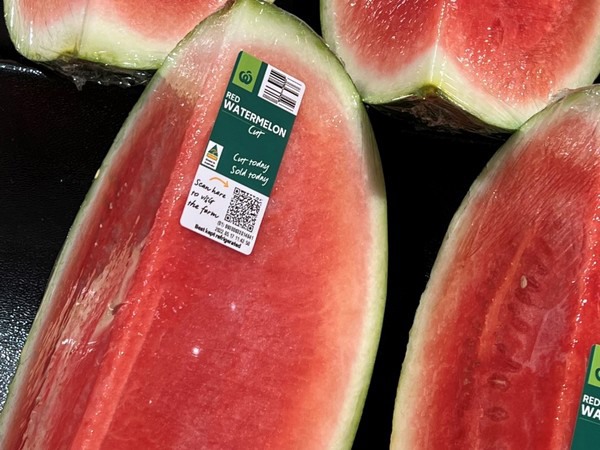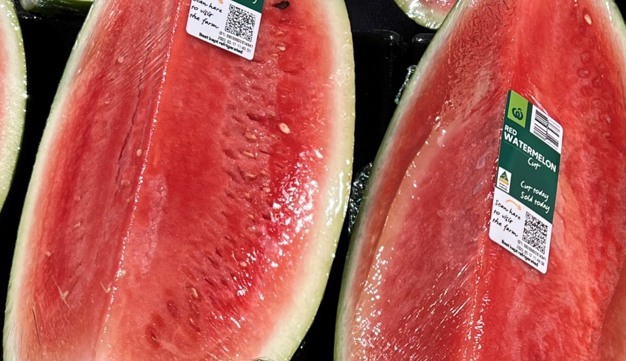Melons Australia has successfully demonstrated a pilot of how to overcome the hurdle of transferring data from whole fruit to cut pieces in the supermarket.
The peak industry body says the project is aimed to maximise consumer engagement with the farmer while boosting confidence in the freshness and food safety of cut watermelons. Achieving through-chain data flow in produce traceability remains a significant industry challenge, as the traceability data flow can be interrupted along the supply chain through different events. For example, a whole watermelon is transformed to cut pieces and put on display in the supermarket. Even if the whole fruit is labelled, the cutting in-stores tends to interrupt the flow of traceability data to the consumer.
That could now be in the past, with a traceability pilot currently underway on seedless watermelons, led by Melons Australia and the NSW Department of Primary Industries (NSW DPI). Seedless watermelons in the domestic supply chain have been trialled in a track and trace pilot involving a Queensland melon grower, along with support from SMA Marketing, FreshChain and Woolworths. As part of this pilot, each whole watermelon was labelled on-farm with serialised and unique QR code with a GS1 digital link URI carrying vital information for partners in the supply chain.

Melons Australia noted the trial successfully transferred all the whole watermelon data seamlessly across to the cut product of that specific fruit, thus maintaining traceability from farm to the consumer in an Australian first. The process to deliver this outcome was a FreshChain solution deployed across the supply chain, including printing labels on-demand in the store with variable data for cut pieces.
The cut-product label also included a human-readable date and time of cut plus a barcode for point-of-sale scan in the supermarket. For consumers, QR codes provided information on farm location, harvest date, food safety certifications and an option to offer feedback on fruit quality.
Melons Australia Executive Officer, Johnathon Davey says the melon industry is taking the lead in the digitisation of product identity and production data sharing and is heavily focused on seeking consumer feedback on the fruit quality.
“Consumers’ familiarity with QR codes during COVID-tracing provides industry with a great opportunity to present QR codes for consumers to scan and appreciate the fruit’s journey and the story of the grower," he said. "We also encourage consumers to provide us with feedback on the fruit quality”.
SMA Marketing (SMA) represents a group of nine watermelon growing businesses across Australia.
“Traceability is critical for us to improve our competitiveness and consumer confidence in Australian-grown fruit," Chairman David Grace OAM said. "Ensuring end-to-end traceability using serialisation and the ability to monitor our supply chain and seek consumer feedback is important for us to meet consumer expectations”.

The melon industry is a significant contributor to the fresh fruit exports from Australia and is ambitious to bolster its presence in the premium export markets by delivering high quality, safe and traceable products. This traceability initiative is aimed to enhance melon traceability, and supply chain monitoring, help prevent food fraud and enable consumer engagement. Implementing digital traceability along with proper labelling can help the industry unlock its competitiveness potential in the high-value export markets.
As part of this project, NSW DPI has developed a traceability adoption framework for the industry to ensure the industry leads in traceability based on globally accepted GS1 standards. To overcome the barriers to the adoption of digital traceability, the project team has developed a decision support system which is currently being validated through these pilot trials. This would enable the melon growers to select the best traceability solution which could meet their business needs and compliance requirements for domestic and export market access.
“A uniform and consistent approach to promoting standards-based traceability are fundamental to ensure the traceability systems in the horticulture sector are fit-for-all across the supply chain," NSW DPI’s lead researcher Dr S.P. Singh said. "In this pilot, we have overcome the greatest challenge of traceability data flow in the melon supply chain."
Melons Australia, the peak industry body for the Australian melon industry, has received funding from the Australian Department of Agriculture, Water and the Environment to enhance the adoption of traceability systems in domestic and export supply chains. FreshChain is a fully integrated, blockchain-enabled, paddock to plate assurance system that verifies the food you eat.
"This advanced traceability project is great news for the industry and provides a template for the fresh food industry facing similar issues with interruption of data flow," Greg Calvert from FreshChain said. "There are limitless opportunities in the digital transformation of fresh food supply chain and to inform, protect and engage the consumers.”
Source: Melons Australia Press Release
For more information
Johnathan Davey
Melons Australia
Phone: +61 407 032 023
[email protected]
www.melonsaustralia.org.au
